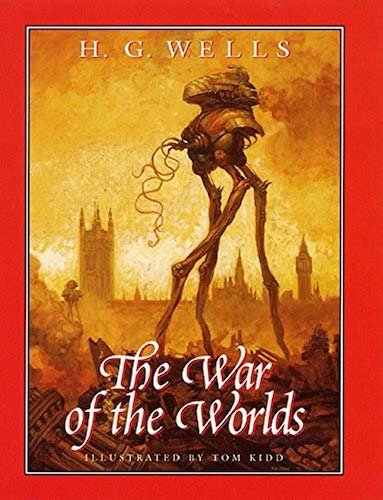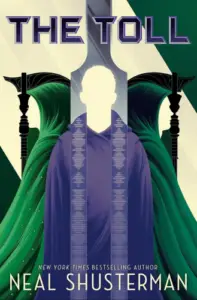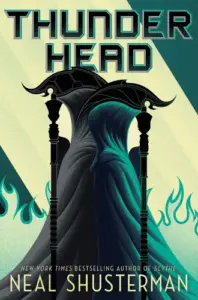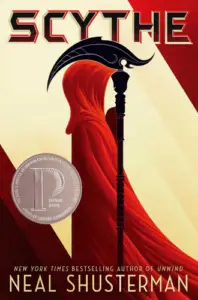The War of the Worlds
Book Author: H. G. Wells
Summary reviewed by:
Terrence Timmons
Terrence Timmons
Analyst
Bachelor of Arts (BA), University Of California, Santa Barbara 2019
With over 4 years of experience as an analyst. Terrence Timmons is committed to analyzing summaries without compromising on quality.
The War of the Worlds: Summary
Invasion on our doorstep—how would you fare against visitors from another world? "The War of the Worlds" sets its stage in the seemingly tranquil countryside of Victorian England, a stark contrast to the unfathomable events that soon unfold. This standalone novel, first serialized in 1897, is a pioneering work in the science fiction genre, encapsulating a thrilling exploration of human resilience and inventiveness in the face of overwhelming extraterrestrial forces.
As the narrative unfolds, residents of the quiet English towns are stirred by what appears to be a series of meteor strikes. However, the fascination quickly turns to horror as these celestial objects prove to be the vanguards of a Martian invasion. Emerging from their cylindrical vessels, the Martians deploy towering tripod war machines, equipped with devastating heat-rays and a noxious black smoke, laying waste to everything in their path.
The protagonist, an unnamed narrator, provides a harrowing account of his survival journey through the ravaged landscapes of London and the surrounding areas. His experiences are paralleled by intermittent glimpses into his brother’s escapades, who faces similar terror in the city. Through these dual perspectives, Wells crafts a gripping narrative that explores the societal and individual impacts of the catastrophe.
"The War of the Worlds" is not merely a tale of invasion; it delves deep into the human psyche, examining our responses to crisis—ranging from disbelieving denial to profound heroism. The novel is an incisive commentary on British imperialism and the nature of human conflict, cleverly mirrored by the merciless conquests of the Martians, who regard Earth with the same imperialist eye as humans do territories they colonize.
This narrative is a masterclass in building tension and dread, with Wells's finely tuned prose driving the urgency of the plot. The chilling realism with which he describes the Martian onslaught makes the terror palpable, ensuring that readers are not merely spectators but feel deeply embedded within the chaos and desperation of the characters.
For anyone intrigued by the blend of speculative fiction and sharp social commentary, "The War of the Worlds" offers a timeless, compelling read that remains profoundly relevant in its warnings and insights.
Spoilers (watch a short ad to reveal spoilers)
The War of the Worlds: Genres
Fiction
Science Fiction
Alien Invasion
Apocalyptic
Dystopian
The War of the Worlds: Main Characters
The Narrator: A philosophic and reflective man, he provides a detailed account of the Martian invasion and its impact on England. His resilience is shown through his persistent struggle to return to his wife amidst the chaos.
The Narrator’s Brother: A medical student in London, he exemplifies resourcefulness and courage, helping two women escape the besieged city, highlighting his values of protection and empathy.
The Artilleryman: His interactions with the narrator offer a vision of human adaptability. His plan to rebuild civilization underground reflects his innovative and survivalist traits.
The Curate: Accompanying the narrator for part of the journey, his descent into madness from the trauma of the invasion illustrates the fragility of human psyche under existential threats.
The War of the Worlds: Themes
Survival against Overwhelming Odds: The relentless struggle of the characters to survive the Martian attack reflects this theme. The narrator’s harrowing journey across the desolated English landscape is a testament to human endurance.
The Fragility of Human Civilization: Illustrated by the ease with which the Martians decimate Earth’s mightiest cities and technologies, showcasing the thin veneer of human society’s stability.
Imperialism and Colonialism: The Martians treat humans as Europeans treated colonized peoples. This critique is encapsulated in the Martian’s indifferent extermination and exploitation of humans, mirroring the brutal aspects of imperialism.
The Power of Nature: Ultimately, it is Earth’s smallest biological entities that defeat the Martians, underscoring nature’s ability to restore balance and the limitations of technological advancements.
The War of the Worlds: Methodology
In our endeavor to provide an engaging and informative summary of "The War of the Worlds," we meticulously analyze the text through expert eyes, focusing on the profound themes and the resonant narrative of human vulnerability and resilience. Our process synthesizes the essential elements of H.G. Wells' classic, highlighting the devastating impact of the Martian invasion and the unexpected salvation by Earth's smallest organisms, ensuring our summary remains true to the original narrative. We uphold the highest standards of quality and integrity, striving to deliver a summary that is not only accurate and readable but also deeply insightful, providing you with a reliable and enriching reading experience.


The War of the Worlds
Date Published: 1898
Disclaimer: As an Amazon Associate I earn from qualifying purchases.




